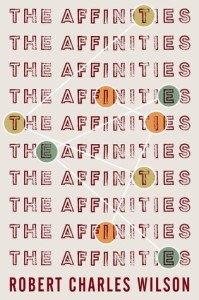 The Affinities, by Robert Charles Wilson
The Affinities, by Robert Charles Wilson
Synopsis: A group of like-minded people who met on the internet form an intentional community.
Book Review: This book starts out FANTASTIC. First, and most obvious, is the sheer writing skill that Wilson displays. His prose is concise and evocative, managing to do with a few lines what would take other authors several paragraphs or pages. I love this ability to cut away the extraneous and reveal the emotional core of any particular scene or narrative. It’s delicious and efficient.
Coming immediately on the heels of that is the promise of exciting events. The story takes place in the near future and addresses issues that intensely concern me. ie: An evolved desire for small-tribe communities that conflicts with modern social organization. The elites becoming divorced from nationalities, becoming essentially stateless. The non-interaction of physically proximate cultures, via filter bubbles and self-selection effects. The replacement of the church (and other traditional institutions) by new social networks, and the resultant backlash.
Wilson portrays a world on the edge of revolution. The old system no longer works. The current system is broken, causing isolation and exploitation. The new system of “Affinities” brings hope of community. It matches people with others who they can trust and cooperate with effectively. They are happy, and their low coordination costs make them extremely competitive, and for this reason the ruling powers are threatened(!). There is retribution coming.
I was extremely excited! I expected this to be a story of social revolution. I expected there to be conflict, and the old corrupt system being burned to the ground and a new ideal raised up from the ashes. For the first half of the novel, the story was trending to ever-greater epicness. A disruptive social tech like this is a game changer.
It seems that Wilson also thought this was an extremely cool idea, and then after he introduced it he didn’t know what to do from there. So the stakes were rapidly lowered, over and over. The tension is ramped down, and we readers get the sense that there will be no fulfillment of any of the big promises. In the end a rival group kidnaps the protagonist’s kid brother. The protagonist stages an incompetent rescue that flops almost immediately. Things are wrapped up when the police show up and basically just do their jobs, because the kidnappers are just as half-assed and incompetent as the protagonist. Also, the Affinities movement fizzles out as quickly as the novel does.
I was so incredibly disappointed I couldn’t even be mad. I was just sad at the wasted potential. Why’d you go and build up all that awesome and promise me all those things, and then not even try to deliver? This is what a one-night-stand with a flashy pick-up artist must be like. /sigh Not Recommended.
Book Club Review: As it turns out, a good ending isn’t necessary for a great book club book! Due to the tightness and effectiveness of the prose, just about everyone finished this and we had a huge turnout! And the most important condition for a book club book – giving us something interesting to talk about – was fulfilled in spades! Since Wilson brought up all these ideas, which concern everyone and everyone has some measure of opinion on, we were able to talk about them at length. There was quite a bit of exchange regarding people’s views on how individuals and societies relate, especially the nerdy kind of individuals who come to SF book clubs. The discussion was wide-ranging and fascinating, and we went well over time.
And of course everyone was also able to put in their dismay at the terrible ending, or comment on their like/dislike of the various characters, and so forth. It is truly an excellent book club book. Strongly Recommended!
Cultural Appropriation Watch: The protagonist is a straight, white, middle-class, youngish liberal male, who works in the arts. I think the Cultural Appropriation Police would probably be very pleased with this book. Of course if they’re hardcore enough they can point out that there are several minor characters of color, and can accuse Wilson of tokenism for that. But surely even they wouldn’t stoop so low.